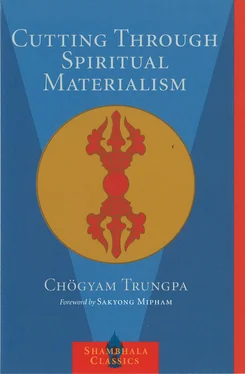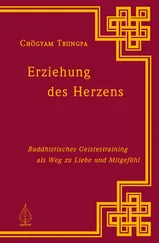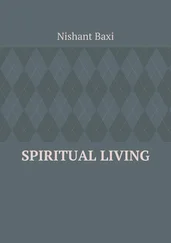Chögyam Trungpa - Cutting Through Spiritual Materialism
Здесь есть возможность читать онлайн «Chögyam Trungpa - Cutting Through Spiritual Materialism» весь текст электронной книги совершенно бесплатно (целиком полную версию без сокращений). В некоторых случаях можно слушать аудио, скачать через торрент в формате fb2 и присутствует краткое содержание. Город: Boston & London, Год выпуска: 2002, ISBN: 2002, Издательство: Shambhala Publications, Inc., Жанр: Религиоведение, Религия, на английском языке. Описание произведения, (предисловие) а так же отзывы посетителей доступны на портале библиотеки ЛибКат.
- Название:Cutting Through Spiritual Materialism
- Автор:
- Издательство:Shambhala Publications, Inc.
- Жанр:
- Год:2002
- Город:Boston & London
- ISBN:0-87773—050—4
- Рейтинг книги:5 / 5. Голосов: 1
-
Избранное:Добавить в избранное
- Отзывы:
-
Ваша оценка:
- 100
- 1
- 2
- 3
- 4
- 5
Cutting Through Spiritual Materialism: краткое содержание, описание и аннотация
Предлагаем к чтению аннотацию, описание, краткое содержание или предисловие (зависит от того, что написал сам автор книги «Cutting Through Spiritual Materialism»). Если вы не нашли необходимую информацию о книге — напишите в комментариях, мы постараемся отыскать её.
Cutting Through Spiritual Materialism — читать онлайн бесплатно полную книгу (весь текст) целиком
Ниже представлен текст книги, разбитый по страницам. Система сохранения места последней прочитанной страницы, позволяет с удобством читать онлайн бесплатно книгу «Cutting Through Spiritual Materialism», без необходимости каждый раз заново искать на чём Вы остановились. Поставьте закладку, и сможете в любой момент перейти на страницу, на которой закончили чтение.
Интервал:
Закладка:
Compassion contains fundamental fearlessness, fearlessness without hesitation. This fearlessness is marked by tremendous generosity, in contrast to the fearlessness of exerting one’s power over others. This “generous fearlessness” is the fundamental nature of compassion and transcends the animal instinct of ego. Ego would like to establish its territory, whereas compassion is completely open and welcoming. It is a gesture of generosity which excludes no one.
Compassion begins to play a part in the practice of meditation when you experience, not only calm and peace, but also warmth. There is a great feeling of warmth which gives rise to an attitude of openness and welcoming. When this feeling arises, there is no longer any anxiety or fear that external agents will act as obstacles to your practice of meditation.
This instinctive warmth, which is developed in meditation practice, also extends into the post-meditation experience of awareness. With this kind of true awareness you cannot divorce yourself from your activity. To do so would be impossible. If you try to concentrate upon your action—making a cup of tea or any daily-life activity—and at the same time try to be aware, you are living in a dream-state. As one of the great Tibetan teachers said, “Trying to combine awareness and action in an unskillful way is like trying to mix oil and water.” True awareness must be open rather than cautious or protective. It is open-mindedness, experiencing the open space within a situation. You may be working, but awareness could also operate within the context of your work, which then would be the practice of compassion and meditation.
Generally awareness is absent in our lives; we are completely absorbed in whatever we are doing and we forget the rest of the environment, we seal it off. But the positive force of compassion and prajna is open and intelligent, sharp and penetrating, giving us a panoramic view of life which reveals not only specific actions and events but their whole environments as well. This creates the right situation for communication with other people. In dealing with other people, we must not only be aware of what they are saying, but we must also be open to the whole tone of their being. A person’s actual words and smile represent only a small fraction of his communication. What is equally important is the quality of his presence, the way he presents himself to us. This communicates much more than words alone.
When a person is both wise and compassionate, his actions are very skillful and radiate enormous energy. This skillful action is referred to as upaya , “skillful means.” Here “skillful” does not mean devious or diplomatic. Upaya just happens in response to a situation. If a person is totally open, his response to life will be very direct, perhaps even outrageous from a conventional point of view, because “skillful means” does not allow any nonsense. It reveals and deals with situations as they are: it is extremely skillful and precise energy. If the coverings and masks we wear were suddenly to be torn away by this energy, it would be extremely painful. It would be embarrassing because we would find ourselves with nothing on, naked. At such a moment this kind of openness and directness, the outrageously blunt nature of prajna and compassion, might seem extremely cold and impersonal.
To the conventional way of thinking, compassion simply means being kind and warm. This sort of compassion is described in the scriptures as “grandmother’s love.” You would expect the practitioner of this type of compassion to be extremely kind and gentle; he would not harm a flea. If you need another mask, another blanket to warm yourself, he will provide it. But true compassion is ruthless, from ego’s point of view, because it does not consider ego’s drive to maintain itself. It is “crazy wisdom.” It is totally wise, but it is crazy as well, because it does not relate to ego’s literal and simpleminded attempts to secure its own comfort.
The logical voice of ego advises us to be kind to other people, to be good boys and girls and lead innocent little lives. We work at our regular jobs and rent a cozy room or apartment for ourselves; we would like to continue in this way, but suddenly something happens which tears us out of our secure little nest. Either we become extremely depressed or something outrageously painful occurs. We begin to wonder why heaven has been so unkind. “Why should God punish me? I have been a good person, I have never hurt a soul.” But there is something more to life than that.
What are we trying to secure? Why are we so concerned to protect ourselves? The sudden energy of ruthless compassion severs us from our comforts and securities. If we were never to experience this kind of shock, we would not be able to grow. We have to be jarred out of our regular, repetitive and comfortable lifestyles. The point of meditation is not merely to be an honest or good person in the conventional sense, trying only to maintain our security. We must begin to become compassionate and wise in the fundamental sense, open and relating to the world as it is.
Q: Could you discuss the basic difference between love and compassion and in what relation they stand to each other?
A: Love and compassion are vague terms; we can interpret them in different ways. Generally in our lives we take a grasping approach, trying to attach ourselves to different situations in order to achieve security. Perhaps we regard someone as our baby, or, on the other hand, we might like to regard ourselves as helpless infants and leap into someone’s lap. This lap might belong to an individual, an organization, a community, a teacher, any parental figure. So-called “love” relationships usually take one of these two patterns. Either we are being fed by someone or we are feeding others. These are false, distorted kinds of love or compassion. The urge to commitment—that we would like to “belong,” be someone’s child, or that we would like them to be our child—is seemingly powerful. An individual or organization or institution or anything could become our infant; we would nurse it, feed it milk, encourage its growth. Or else the organization is the great mother by which we are continuously fed. Without our “mother” we cannot exist, cannot survive. These two patterns apply to any life energy which has the potential to entertain us. This energy might be as simple as a casual friendship or an exciting activity we would like to undertake, and it might be as complicated as marriage or our choice of career. Either we would like to control the excitement or we would like to become a part of it.
However, there is another kind of love and compassion, a third way. Just be what you are. You do not reduce yourself to the level of an infant nor do you demand that another person leap into your lap. You simply be what you are in the world, in life. If you can be what you are, external situations will become as they are, automatically. Then you can communicate directly and accurately, not indulging in any kind of nonsense, any kind of emotional or philosophical or psychological interpretation. This third way is a balanced way of openness and communication which automatically allows tremendous space, room for creative development, space in which to dance and exchange.
Compassion means that we do not play the game of hypocrisy or self-deception. For instance, if we want something from someone and we say, “I love you,” often we are hoping that we will be able to lure them into our territory, over to our side. This kind of proselytizing love is extremely limited. “You should love me, even if you hate me, because I am filled with love, am high on love, am completely intoxicated!” What does it mean? Simply that the other person should march into your territory because you say that you love him, that you are not going to harm him. It is very fishy. Any intelligent person is not going to be seduced by such a ploy. “If you really love me as I am, why do you want me to enter your territory? Why this issue of territory and demands at all? What do you want from me? How do I know, if I do march into your ‘loving’ territory, that you aren’t going to dominate me, that you won’t create a claustrophobic situation with your heavy demands for love?” As long as there is territory involved with a person’s love, other people will be suspicious of his “loving” and “compassionate” attitude. How do we make sure, if a feast is prepared for us, that the food is not dosed with poison? Does this openness come from a centralized person, or is it total openness?
Читать дальшеИнтервал:
Закладка:
Похожие книги на «Cutting Through Spiritual Materialism»
Представляем Вашему вниманию похожие книги на «Cutting Through Spiritual Materialism» списком для выбора. Мы отобрали схожую по названию и смыслу литературу в надежде предоставить читателям больше вариантов отыскать новые, интересные, ещё непрочитанные произведения.
Обсуждение, отзывы о книге «Cutting Through Spiritual Materialism» и просто собственные мнения читателей. Оставьте ваши комментарии, напишите, что Вы думаете о произведении, его смысле или главных героях. Укажите что конкретно понравилось, а что нет, и почему Вы так считаете.











